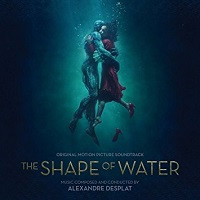- Composed by Alexandre Desplat
- Decca / 2017 / 77m
An unusual romantic fantasy film, The Shape of Water looks at the relationship between a mute woman who works at a government research facility in Baltimore in the early 1960s, and the subject of the research – a humanoid amphibian discovered in a South American river. Guillermo del Toro’s film may sound strange but is his most highly-acclaimed in a number of years, receiving an almost universally enthusiastic critical buzz and plenty of major awards consideration.
Del Toro has worked with a number of fine film composers over the years; this film marks his first collaboration with the great Alexandre Desplat. The composer writes in his album notes that when he first saw the film, it seemed to him to be like a musical for which the music was yet to be written, and Desplat’s score plays a pivotal role in the film – with the composer’s score taking a few turns just as surprising as those in the film.
The first three score tracks introduce the three major themes. The title track offers the warm main theme, swirling and undulating, typically Desplat but emphasising a kind of throwback to a romantic sound of yesteryear, with a very distinctive Gallic flavour thanks to the accordion. It isn’t the only unorthodox musical choice – we also hear glass harmonica, and the score’s very distinctive woodwind timbre, courtesy of a massive flute section (containing no fewer than twelve). “The Creature” is more orthodox: Desplat gives him initially a little menace from low strings and more than a little mystery from the flutes. Perhaps best of all is “Elisa’s Theme”, which is just stunningly beautiful: the flutes flutter as in Birth, accompanying the melody which is largely carried by the accordion. Again it’s very old-fashioned romantic (in the best possible way), sweeping and swooning away, delightfully fluid and shimmering. A highly unusual touch comes in the form of whistling, performed by the composer himself, heard throughout the score.
From these building blocks most of the score is constructed. “Fingers” is a darker piece for the creature, before “Spy Meeting” has a slightly comic feel to it; but then there’s a deliciously light take on Elisa’s theme in “Elisa and Zelda”. “Five Stars General” features a bit of the main theme, but it’s got a sadness to it in this form, a melancholy which is rather haunting. “The Silence of Love” sees the themes for the two main characters come together, starting to become somewhat entwined – again, the accordion and whistling give it such a distinctive feel. “Egg” is an interesting piece, veering from the gorgeous romantic theme to some pretty dark, tense action/suspense material (and back again).
After the dark suspense of “That Isn’t Good” comes another romantic piece, “Underwater Kiss”, and then what is the centrepiece of the score, the eleven-minute “The Escape”. It goes on quite a journey through its lengthy running time, as you might expect, beginning with the familiar Desplat electronic pulse which leads in to some dynamic, dramatic suspense (the low-end piano another trademark of the composer) and eventually to some exciting action material, recalling in some ways The Ghost Writer, with the brassy outbursts over rumbling winds and choppy strings.
“Watching Ruth” sees things go ultra-romantic again and this remains the theme during the majority of the remaining tracks. There is a militaristic hint to “Decency” with the snare that runs through it, and “He’s Coming For You” offers some good old monster music (not entirely unlike the composer’s outstanding Godzilla) but then the final four cues offer unabashed romance, sweeping and emotional. First is the piano-led “Overflow of Love”, which does just what its title suggests; then the more melancholic “Without You”, the two characters’ themes again coming together as one. There’s a surprisingly dissonant opening to “Rainy Day” but melodic service is soon resumed in grandstanding fashion (there’s actually an epic sweep to the piece as it goes on), and finally everything gets wrapped up in the ravishing “A Princess Without a Voice”.
Alongside the fifty minutes or so of score, the album also features various songs, most notably a new arrangement (by Desplat) of the old Harry Warren/Mack Gordon standard “You’ll Never Know”, sung by the great Renée Fleming accompanied by the London Symphony Orchestra (which also performs the score) and a jazz combo. But, important as some of the songs are in the film, the star is undoubtedly the score, which is yet another from the top drawer of Desplat, one of the most consistently impressive film composers of the last couple of decades. I love that he has managed to be so successful without having to water down his highly-distinctive musical voice at all, and I love that he is able to take such a distinctive musical voice and still fashion so many scores which feel completely uniquely-suited to the particular film in question (something which all the great film composers of the past were able to do, but which is a rare gift in the 21st century). That The Shape of Water is so impressive but actually not even the most impressive score the composer wrote during 2017 is further testament to his quality.
Rating:
**** 1/2
Sumptuous, creative romantic fantasy music
facebook.com/moviewave | twitter.com/MovieWaveDotNet | amazon.com













But don’t you have the feel that this album is very consistent making it to be preferable for multiple revisits than the disjointed yet stunning valerian album? That why I would believe this deserves a five star
I can understand why someone would think that and I love them both, but Valerian just pips it for me.
To compose the Top15 of Best Scores 2017 for Screensoundradio I had to reconsider both scores. Eventually “Valerian” ended up in the shortlist, “Shape of water” made it due to the superb orchestrations and melting together of themes.